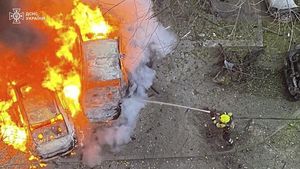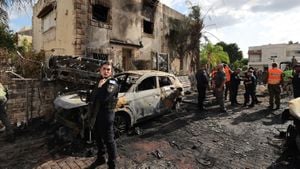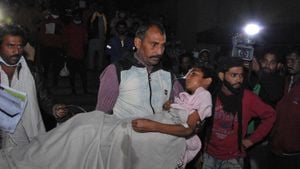The air quality crisis gripping Delhi has reached alarming levels, prompting the Supreme Court to step in and impose stricter measures aimed at curbing pollution. With the city's Air Quality Index soaring to 484 on Monday morning—classified within the 'severe plus' category—the court took swift action to enforce the Graded Response Action Plan (GRAP) Stage IV restrictions. This decision follows years of struggle to manage pollution, exacerbated by seasonal changes, vehicular emissions, and agricultural practices like stubble burning across neighboring regions.
Justice Abhay S. Oka and Justice Augustine George Masih presided over the hearing where they expressed frustration over the Delhi government's delayed responses to worsening air quality. They questioned why specific measures weren't implemented immediately when the AQI indicators crossed the 300 mark, arguing the risks associated with procrastination were too grave. "How can you take risks and delay invoking GRAP?" Justice Oka pressed, stressing the necessity for immediate action rather than waiting for conditions to improve.
The Supreme Court ordered the Commission for Air Quality Management (CAQM) to enforce the stringent GRAP measures without discretion from state authorities. It stated, "You will not go below Stage IV without our permission—even if the AQI drops below 300." This directive firmly places the responsibility of air quality management on the shoulders of the government, with the court keeping close tabs on compliance.
The current pollution crisis is attributed to several factors, including significant stubble burning reported from states like Punjab and Haryana. Delhi Chief Minister Atishi highlighted these issues during her media interactions, pointing fingers at neighboring states governed by the central BJP government for their lack of action against agricultural burning—a key contributor to the region's dire air quality. "Ninety percent of farm fires have reduced significantly in Punjab, whereas, Uttar Pradesh has seen a 60 percent increase," she lamented, making clear her frustrations about the central government's failure to tackle pollution effectively.
The PM 2.5 levels resulting from hazardous air have serious health ramifications, particularly affecting vulnerable populations such as children and the elderly. Recognizing the health risks, the Supreme Court ordered immediate discontinuation of physical classes for all school students up to Class 12. The court made it clear: protection of health is non-negotiable, referring to cases of respiratory issues observed among schoolchildren due to the intolerable pollution levels.
Adding urgency to the situation, senior advocate Gopal Sankarnarayanan emphasized during the court session how toxic conditions aren't just abstract concepts—they manifest as real health crises. "The AQI levels we see inside this courtroom are as high as 994," he stated, underscoring the imminent health threats posed by prolonged exposure to such significantly polluted air.
Apart from banning physical classes, measures under Stage IV of GRAP include halting construction and demolition activities, which are notorious for generating dust. The ban extends to several industries and mandates the use of anti-smog guns for dust management, with officials now on alert to enforce compliance vigorously.
With the weather conditions proving unfavorable for dispersing pollutants—coupled with fog and cold temperatures—the situation is predicted to worsen if not managed properly. The Indian Meteorological Department's forecasts warn of continued 'severe or severe+' classifications for air quality over the coming days, making the implementation of these restrictions all the more urgent. Visibility across various parts of the city dropped significantly, disrupting both road and air travel and compounding the crisis.
Organizations representing public employees have begun to express their concerns, advocating for staggered work hours and remote work options to minimize health risks caused by exposure to hazardous air. The Central Secretariat Service's Forum highlighted the noticeable impacts of pollution on workplace productivity and worker health, pushing for immediate action on these fronts.
The Supreme Court's proactive stance reflects growing public pressure. On November 14, it had previously showed concern when discussing violations related to last year's firecracker ban during Diwali celebrations. Commissioner-level sessions were called to hold the government accountable for the execution of strategies aimed at curbing pollution, reiterative of the judiciary's role in safeguarding public health.
The court's intensifying involvement is likely to set rigorous accountability standards for local and state governance, as the Delhi government grapples with criticism not just from the public but within its corridors. The right to live in pollution-free environments continues to be reinforced as fundamental, as embedded within Article 21 of the Constitution of India. A constitutional mandate like this places the onus on the state to legislate and enforce for the public good.
Looking at the broader impact—when heavy policy directions filter down, local administrations and individual citizens are expected to follow suit. Will the government support efforts for systemic change, or will they treat pollution control as another episodic response? Only time will tell, but the scrutiny is now hotter than the air itself, filtered by layers of bureaucratic response.
How this situation will evolve remains uncertain, but as temperatures drop and air quality worsens, one thing is clear: strong commitments and actionable policies have never been more consequential. The clock is ticking, and each day of negligence adds layers to the smog clouding India’s capital. An efficient response, backed by citizen cooperation, is imperative. Failure to act decisively could result not only in environmental degradation but also irreversible public health damage.
Polling and political sympathies may shift as well as parties reassess their positions and strategies based on public response. The Delhi Assembly elections loom, and environmental management could very well become the defining issue of the political season. The Supreme Court and civil society's roles may blend together as insulated challenges continue to require unified, nation-wide action.
Several arteries of discourse have opened, and the onus lies with representatives of both governance and civil activism to prevent this occasion from sinking under the weight of neglect. Each decision made must accommodate the needs for clean air—there can be no compromise on health. Sustainable solutions centered on the realities of pollutive practices will prove pivotal not only for the present generation but for the future of Delhi and its peoples.



